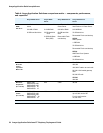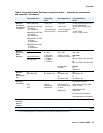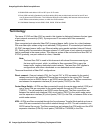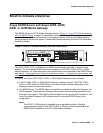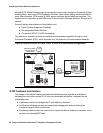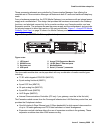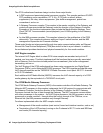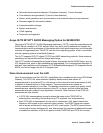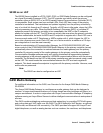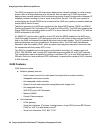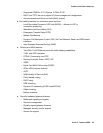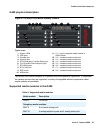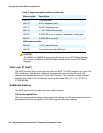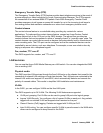
Avaya Application Solutions platforms
42 Avaya Application Solutions IP Telephony Deployment Guide
● Voice quality is impacted when played over IP. However, quality is acceptable even with 2
hops and 10-msec delay.
● The use of G700 VAL sourced announcements impacts that gateway’s overall occupancy,
and IP Telephony resources (for example, high use global announcements such as the
main greeting and some VOAs) should be handled by TN2501 circuit packs if the agents
are not homed to that G700.
● FTP access for the G700 announcements use the same IP address as the address that is
assigned to the G700 when installed (this address is displayed on the Media-Gateway
form).
S8300 primary controller architecture
The S8300 Server has the same form factor as the Avaya media modules. The S8300 is
installed in slot V1 of the G700, G450, G350, or G250 Media Gateway. The S8300 can be
configured as either a primary controller (a.k.a. “ICC”) or as a local survivable processor (LSP).
Configured as a primary controller, the S8300 provides Communication Manager call control.
The controller targets the small-line-size, cost-conscious portion of the market, and as such,
must be cost competitive with other solutions. The controller is based on standard Intel IA32
architecture, and runs the industry-standard Linux operating system.
The S8300 runs the following co-resident applications:
● H.248 Media Gateway Controller
● H.323 GateKeeper
● Communication Manager Feature Server
● INTUITY AUDIX Messaging system (installed in the G700)
The S8300 primary controller, when installed in the G700, can be ordered both with and without
INTUITY AUDIX support.
The S8300 faceplate provides connectivity for two USB devices, and an Ethernet port for
technician access. The faceplate also has operational LEDs and a shutdown switch. The media
module backplane connector provides the interfaces for the internal 10/100 Ethernet bus and
the TDM Bus.
For information on S8300 performance and capacities, see Table 4:
Avaya Application
Solutions comparison matrix — components, performance, and capacities on page 34.



